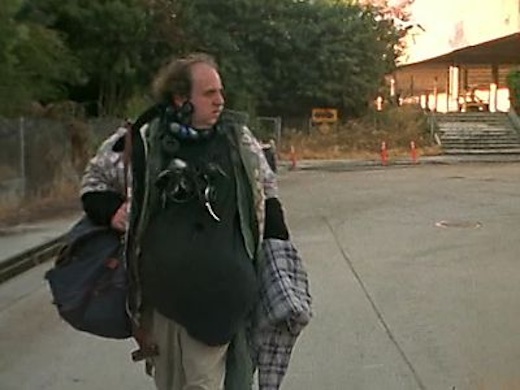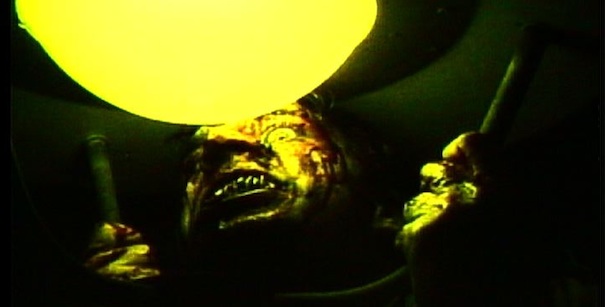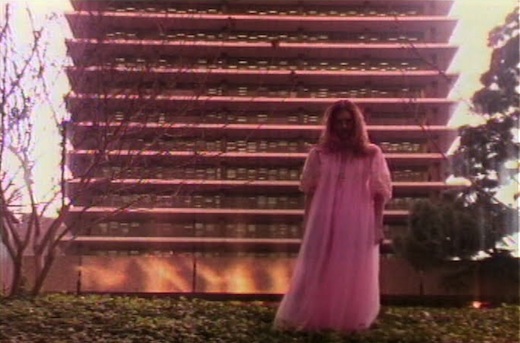A year ago, I contacted the cult filmmaker Damon Packard through Facebook for a straightforward interview while he finished shooting and editing his latest film, Foxfur. Somehow, our e-conversation has lasted one year.
I found myself sucked into this discussion the way I fell down the rabbit hole of Reflections of Evil, Packard’s hallucinatory masterpiece of horror and satire, which I consider one of the great films of last decade. Before we knew it, the equally phantasmal Foxfur was finished and making the festival/arthouse/museum rounds (including public screenings at the 2012 The New York Film Festival).
Please suspend any expectations of a standard journalist/director interview before reading what is essentially two film lovers discussing the state of the art and things to come.
Spring-Summer 2012
Keyframe: Damon, please tell me what I should know about Foxfur going in, and how it came about. This ‘1982’ theme in particular really resonates with me, as a person who cringes at the news of a Blade Runner prequel (and who recently fell into a deep depression after seeing Scott’s Prometheus, incidentally).
Damon Packard: Well, Foxfur began a few years ago with a full script and a producer involved. He backed out after going broke so i was left to either make the film for $100 or make nothing. Making nothing would have been the far more sensible route but I went ahead and cobbled together a (first act) no-budget version in small bits and pieces over the last year or two. And this is the film I have now. Another no-budget waste of time and energy that does not deliver the goods, The 1982 theme in the film is connected with the story. In the film, ’82 was the year the world actually ended, the skewed timeline we’re in now is what’s known as a ‘dead zone,’ a time that does not exist, where things do not progress and move in circles in a dark path of despair. For all the unfortunate souls caught in this dead zone, they will remain. The December 2012 date is also connected with the plot in the same way the Montauk Project 1983 date fits in.
Keyframe: ‘Making nothing would have been the far more sensible route but I went ahead…’ Well, what makes you ‘go ahead,’ every time? It seems you can’t NOT make movies, regardless of money problems. The question is, if making nothing is so sensible, why can’t you set this filmmaking folly aside and go sell insurance or something?
Packard: Yeah, I don’t know. It’s always a wrestle for me on whether it’s worthwhile doing something or nothing. I suppose it’s a little more worthwhile doing something, but one is so limited on a no budget scale it’s hard to justify it. It’s a harsh thing to say, but I can’t help but feel (now that EVERYONE is making low budget films) the predominant bulk of what’s being produced is a completely worthless pointless waste of time and energy. People need to create, they need to do it for themselves, they need to discover for themselves, even if it means spinning in circles and endless carbon copies of what we’ve seen before and sticking to endless play-it-safe formula’s. I suppose that applies more than ever for big studio films so it’s unfair to point at low or no-budget indie stuff, but as an example, there’s nothing that I hate more than ‘minimalist films’ set in one or two locations. And if I’m going to say things like that I have to include my own work as well. But I can’t help but feel it’s the truth. At least when we were in an earlier age of filmmaking and there were FAR LESS people ‘spinning their wheels;’ there was much less waste. I don’t particular mind the waste or have anything against it but everything has become niche-audience oriented, there is no ‘good’ or ‘bad’ and the whole scene is no longer exciting like it was in its groundbreaking phase many years ago. It’s a mass digital multi-media platform world now. Media entertainment is everywhere in its myriad forms.
Keyframe: And yet Reflections of Evil gained its cult status partly because of this new multi-media platform, which was just revving up when you were finishing that film. In fact, I first came across Dawn of an Evil Millennium as part of a ‘horror’ compilation download on the Greylodge torrent page five years ago. I burned the compilation to disc, popped the disc in my DVD player and was blown away by its impact on a larger-than-320 x 240 screen. Sometimes I think there are great microbudget films that simply need a big screen and a live audience to show us what they can really do.
But what you say about the fragmentary nature of movie-going now really speaks to me. I appreciate the democracy and Netflix-era platter of choices, but it seems there are no longer any truly BIG movies that bring diverse segments of the audience together for a transcendent experience. I mean, ‘everybody’ went to The Avengers only because of the steady, deafening marketing drumbeat, not because the name JOSH WHEDON electrified the masses with a sense of possibilities akin to the banner A STEVEN SPIELBERG FILM circa, say, 1982!
Packard: Yeah, definitely. Certainly I can’t say the multimedia explosion hasn’t provided my films with an audience, I’m all for it, especially if quality standards keep improving (a la flash compression and such). I love torrents and YouTube. But at the same time it has changed and diminished the value and significance of movies on a whole. It’s no big deal anymore. At one time films were almost the center of culture. We were moving through different groundbreaking eras as consciousness and creativity moved up the ladder of experience. Now films or ‘HDM’s’ (Hi-Def movies) are just part of the mass-choice entertainment palette. And, as you said, videogames are bigger than cinema and it’s a videogame culture, so they follow those aesthetics. Getting back to the quality standards issue, it’s odd because with the advances of technology in many ways I think we’ve taken too many steps backward with theatrical presentation. Digital can look nice and bright and colorful but it’s more-than-often way too dark (especially 3D) and it’s just not as good as film. It doesn’t have the organic vibrancy and texture, there is no feeling or atmosphere to it. It’s too clean and perfect. We’ve lost that and it’s unfortunate. Tarantino calls digital the ‘death rattle’ because it destroys the illusion of film which is still frames moving at 24fps, and he has a point. But whether he likes it or not his films will be projected digitally for the rest of his life.
Keyframe: I think one workaround for that lack of ‘organic vibrancy and texture’ (I love that description) is finding those qualities in your subject. One of the great, great films of last decade, In Vanda’s Room by Pedro Costa, works this way. He uses some kind of early three-chip mini-DV camera to document life in a Cape Verde slum. It’s astonishingly beautiful stuff, and he started making films in this kind of threadbare way out of frustration with his previous practice, where he had gorgeous 35mm, sure, but the presence of big crews and equipment made the ‘organic vibrancy’ of the situations he was capturing sort of evaporate. While folks are quicker to call your films ‘brilliant’ before they’ll consider them ‘beautiful,’ I’ll say that to the extent that there’s beauty in Reflections of Evil, it comes from the collision of raw, street-level situations and the digital tools you used to bring it all together.
What happened in the “real” world since 1982? And what effect has it had on the movies (and vice versa)?
Packard: You mean in the Foxfur fictitious world? Well the world ended physically in ’82 and spun into a dead zone timeline. A ‘dimensional splinter’ where nothing progresses and everything turns in circles, a time not meant to exist. Though the bulk of humankind aren’t necessarily aware of it, many sense something is wrong, things just don’t feel right. There is no magic left in the world, no spark of imagination no surprises that delight. Nothing to really look forward to. Naturally this would affect movies, music and all forms of art
Keyframe: Is this film a direct allegorical response to the way the world has turned in the past 30 years? That’s the way my despairing-of-these-times mind wants to interpret it.
Packard: Absolutely, it is a direct reflection of how the world has turned in the past 30 years. Though I wonder how the ‘dead zone’ affects remote sectors of the world not so developed in technology and pop culture? Ancient tribes in South America, Africa, Russia and Asia for example?
Keyframe: I’d like to imagine that life is barreling on in the Third World, even if that ‘barreling on’ is mostly working at iPad factories and such, to help preserve the First World illusion that we aren’t living in stagnancy, haha. But, like you, I wonder if the stagnancy is this bad in other developed countries. What’s odd, though, is the great number of people here who feel like we’re living in a time of innovation, at least in mass media. Folks who see Prometheus 3D as some great leap beyond Alien.
Packard: Yeah, that delves into the whole ‘interpretations of reality’ subject, in that everything is subjective. Which reality is the correct one? And who’s to say? Do the larger numbers dictate which reality is the correct one? There are those who know how easy it is to sway and influence and manipulate realities, and this could even include the film industry and its shift in aesthetics. Do people really know how to decide for themselves what is good and bad, what is ‘brilliant’ and what they like and should see? Can they be influenced to believe anything? Heaping enormous predominant praise on an endless downpour of terrible movies for example. Does this only apply to a certain ‘camp’ of the larger masses? Yes, plenty of people out there not quite ‘brainwashed’ by this new reality but the dominating one seems to far removed. Which reality is the correct one, is there such a thing? Take me for example, I will NEVER EVER succeed in this reality; the audience is too small. The dominating one will always ignore and eschew and keep their distance. I will probably die penniless in a gutter lying in a pool of blood, broken glass and broken teeth. Unless it is possible to jump realities.
Keyframe: If you were to succeed in the terms that Hollywood and Indiewood set forth, do you think you could make a film that was good by your standards?
Packard: Well it’s hard to say. It depends on how much my hands are tied and how many layers of compromise are involved.
Keyframe: I know you have a big premiere coming up, but I’m never quite sure what’s real—for yo—in your world. You portray yourself as a failure, but the fact is your work is commissioned and invited to festivals around the world that most filmmakers would kill for.
Packard: Well, the festival exposure and commissions really aren’t much to speak of. In all truth, they are sparse, minor, few and far between. I don’t mean to sound ungrateful or anything. I’m always delighted and privileged when/if someone wants to show something, but the truth is it IS pretty rare. And of course they never result in anything or bring about circumstances that would insure a more sound financial situation.
Keyframe: What is your writing process?
Packard: I really don’t have one, and honestly very rarely am I writing I think during the Foxfur re-writes I was starting to really get the hang of the process and get past the endless writers block. I was rather enjoying it, because normally I have troubles in that department, endless writers block. But when forced to do under a deadline it happens and it flows out. I was just starting to get into the swing of things when shooting came to a halt. I mean, what sporadic, brief shooting there was scattered out over months and months but there were some months where I was scrambling to get some days in with lots of last minute re-writing/re-working pages of dialogue.
Keyframe: What was your experience/relationship with your actors? How did you find them and were they easy or difficult to work with? How do they feel about the fact that there is a red carpet Hollywood premiere coming up?
Packard: Well a couple of them have been completely silent on the matter, so I’m not sure. A couple of the other actresses may be surprised to find themselves in the film at all, as I was just shooting test footage. And that goes for the opening Foxfur scenes with Angel Corbin, She’s been completely confused and nonplussed by the whole matter of showing up stressed out for some rehearsals and then ending up in the film. I think what’s even more confusing to her is many months later, when I was in another desperate bind to find a FAST replacement Foxfur to finish a sequence (a common situation on this film). On that list of actresses I was contacting, I asked her if she wanted to come back again and fill in for a night. She was completely confused and frazzled. Mind you, I tried many times to get other cast members back to no avail. They were too busy, other obligations, etc. Lack of money is the bottom line, I paid everyone what I could and it fluctuated but it didn’t leave a lot of motivation for actors to return.
I find it EXTREMELY difficult if not near impossible to find interesting/genuinely talented people who are willing to work for very little money, and no money, forget it. Lets face it, even with an UNLIMITED budget it’s near impossible finding genuine talent, at least the kind that I’m looking for. So doing this on a no budget scale? This was an issue from the very start, IF I could NOT find people were at least relatively acceptable I would not shoot a frame of film. It just wasn’t worth it. Well, as always and expected I made some compromises on that, it was do something or nothing,…perhaps too many compromises in the end simply for the sake of completing some sequences. But in general I’m very pleased with the cast. I think they’re all great.
Keyframe: What do you think of the current 3D craze? Is it, for better or worse, the future of filmmaking? And do you plan to make any 3D films (since the equipment seems to be available for it at even the microbudget level now)?
Packard: It’s a desperate last-minute gimmick for the studios to rake in as much as they can before it all collapses. It’s funny because it’s just a 1950’s gimmick and frankly I can hardly tell the difference between old 3D (anaglyph and polarized) and all the new methods. Most of the time the image is way too dark (especially with digital projection) and I get blurry ghosting in the image. Maybe it’s just an issue with my eyesight. On a rare occasion I’ll get a good presentation with effective 3D (such as Hugo) so I don’t have anything terribly against it and am not against using it. I’d much rather shoot in 70mm or IMAX and just have a good solid presentation than dark blurry 3D but I guess those days are over. It is encouraging to see filmmakers like PT Anderson (shooting in 65mm) and Panos Cosmatos shooting in Techniscope though.
Keyframe: How do you feel about current film scores?
Packard: Film music seems to have really gone down the drain, especially since we’ve lost so many great masters (Goldsmith, Barry, etc.) with the current trends all towards percussion and incidental music in order to please studios, producers, etc. Efficacious scores are all they care about. There is very little creative melodic identity & experimentation with many scores now. When you hired someone like Goldsmith you knew you were always going to get something special regardless of how much of a hack project it was. He would find a way to build a melodic identity, to give it a heart & soul and sometimes it was just his own way of continuing his craft. In some ways a lot of the films someone like Goldsmith scored were more about a new Goldsmith composition than the movie.
This is the kind of score which is important for me (and so incredibly rare now.)
A score that has its own identity and stands alone as something special, yet gives so much impact, emotion and soul to a movie. How often do you get that anymore? Even from the few remaining masters of the field (Williams, Horner, etc.). Scores are all too often forgettable now.
Keyframe: Any particular composers or scores you still like?
Packard: A few like Joe Hisaishi, Alexander Desplat, Elliott Goldenthal, Williams, Horner. On a rare occasion James Newton Howard will come up with a nice melody or two. Listen to the specific theme called ‘Obliviate’ from Alexander Desplat (I’m not going to mention what film because I don’t want to associate the film with the score.) Or James Newton Howard’s End theme music for Lady in the Water. Terrible movie, but listen to that particular theme. I like the work that Cliff Martinez does, too.
Keyframe: I have to agree with you 1,000 percent there. And not only that, it seems that the recent scores which DO employ a full orchestra all sound alike. I cannot tell a Mark Streitenfeld from a Steve Jablonsky from a Harold Kloser score. They all sound like Hans Zimmer on autopilot.
What is your all-time favorite film, and why? What is your dream project? And what would you love to be asked that hack reporters like me have yet to ask? (And answer, please.)
Packard: My favorite film is Miyazaki’s Kiki’s Delivery Service. Dream project, not sure anymore. I used to have dream projects. I’d still like to make a Shakespearian film. Or a story set in ancient Ireland or Scotland all in Gaelic with lots of music by Maire Brennan and Clannad. A kind of celtic Quest for Fire. Perhaps an American Graffiti‘esque romp about working for Mann Theaters in Westwood in the eighties.
On an extremely rare occasion I like some of what Steven Soderbergh does, I liked Haywire anyway. I think Hayao Miyazaki is my favorite filmmaker/storyteller of the modern age.
Film music seems to have really gone down the drain, especially since we’ve lost so many great masters (Goldsmith, Barry) The current trends all seem to be towards percussion and incidental music in order to please studios, producers. They want efficacious scores, pure and simple. There is very little melodic identity and experimentation with a lot of scores now. When you hired someone like Goldsmith or Williams you knew you were always going to get something special regardless of what the project was. They would find a way to build a melodic identity, to give it a heart and soul. Sometimes it was just a way of continuing their craft. A new Goldsmith or Williams scored film was (sometimes) more about the MUSIC than the film.
This is the kind of score which is important for me (and so incredibly rare now). A score that has its own identity and stands alone as something special, yet gives so much impact, emotion and soul to a movie. How often do you get that now? Even from the few remaining masters of the field (Williams, Horner, etc.) The magic seems to have faded. Score’s are all too often forgettable now, they all sound alike.
Keyframe: Did I ever ask your opinion on Prometheus? [The movie of the moment at that time.] I know I ranted about it, but, if you saw it, what was your reaction to the film?
Packard: Prometheus was terrible, a hideous disappointment. It’s unfortunate it had anything to do with the Alien universe, because that first film is such a masterpiece. This one really sullied its image. I just don’t know what happened to Ridley Scott, he seems like such an intelligent filmmaker and he TRIES but how he could end up as unforgivably inept as that is beyond comprehension. I keep giving him chances over and over, hoping against hope. Maybe it’s age? Maybe it’s the dead zone? I don’t know,..I just don’t know. getting old is a terrible thing. I already feel like my life is over at forty five! And I’ve been at this since I was fifteen. There’s a depressing thought.
Keyframe: Truly, the difference between young George Lucas and old, young Ridley Scott and old, spells out what happened to movies over the past three decades. I don’t think any of the 10,000 commercials Scott directed were as mechanical as this shit. Regarding getting old: I can’t agree. I look forward to this new phase in filmmaking (if the world is still here). Hollywood is no more, but this new age actually favors handmade filmmakers like you (in all but riches). Age ain’t nothing but a number, as the R&B song goes. Hampton Fancher made The Minus Man in his sixties, and it is still superior to anything a hipster wunderkind might dream up. Lynch, Hellman, Coppola and Schrader are all skewing closer to the YouTube way of doing things than the studio way. And their work, good, bad or ugly, is alive, vigorous, new. James Cameron can’t say that. 103 year old Manoel de Oliveira is still churning out masterpieces. You’ve been at it since fifteen. You’ve almost certainly just made another cult classic. There is no reason to stop now, in a time when no-budget movies can look beautiful and find an audience. I fell in love with this movie Girl Walk // All Day recently, and with the girl in it. Pure cinema, for a thin dime.
Packard: It’s definitely true, age being a number. The human body peaks around thirty, thirty five, then starts aging but we remain the same age despite the body. Which is to say, we are ageless.
Keyframe: Can you reflect upon Reflections of Evil? First, what did you set out to say or express through that film initially? And has its meaning or resonance changed for you in any way after 10 years?
Packard: I think essentially I wanted to make a film about anger and fear, and how that manifests into a collective energy. That was wrapped within a lot of other scattered crazy ideas.
Keyframe: How was the Foxfur premiere? Seeing your work on the big screen with a large, in-tune audience must make a lot of the production travails worth it…?
Packard: The premiere went great except the projectionist was really irritating me because he kept turning the volume down and wouldn’t play it loud enough. Also there were some sound sync problems with the delay from the DVD player to screen. Not a lot of people showed (around 150) which is typical for any of my screenings. I never attract large crowds. That’s always the way it has and will be, and sadly that proves beyond the shadow of a doubt I’ll never break through beyond that niche audience.
Fall-Winter 2012-13
Keyframe: When we last spoke during the summer, you sounded a bit worn down by the uphill effort of making and promoting a film with so little money. Since then, Foxfur has had a red carpet premiere in Hollywood and screened in several topnotch venues. Now you’re about to screen at the New York Film Festival (your second film to do so, correct?) Have your plans or perspective changed any since we last spoke? It appears to be travelling the world to various arthouse theaters and museums.
Packard: Yes it is. I must say I thought any interest would completely die off, but it hasn’t. It’s currently showing for a month in Germany at Loris Gallery after finishing a run at Union Gallery (London) also it’s screening February 18 at the Chauvel Cinema in Australia, and it’s showing in Chicago this month as well, (I think) February 19, at the Nightingale Theater. I’m starting to lose track and forget dates. After this month it’ll probably die off though, and nobody ever shows up for these screenings, they usually average about 10 or 15 people max so it’s strange people keep screening it. A small distributor run by a friend of mine is possibly supposed to be releasing it this summer but they have NO money to pay for rights, (I’ve gone from $500 for rights to $0) he’s simply going to try and get it out there, VOD, cable, small DVD run, etc. So I’m testing the waters to see if I can get an original score. Currently in talks with [Tangerine Dream co-founder] Edgar Froese but he’ll want too much money and likely be booked for months.
Keyframe: That’s pretty cool, essentially talking with your idol about doing a score….Although Foxfur is technically feature length, if backers came along interested in expanding it to, say ninety minutes, would you also be interested, or are you already thinking of the next project?
Packard: I am certainly FAR more interested in moving on to the next thing but…outside of there being no money, I just don’t have any burning-driving-inspired ideas for anything at the moment. Certainly nothing in the micro budget/out-of-pocket range. I have a few ultra-vague, nebulous, hazy, barely formed on the nano-scale micro-concepts that I’m not sure could make any kind of interesting narrative but aside from that. NOTHING. I’m not sure there is ANYTHING I can say or do that is worthy or interesting enough to justify the trouble in making it, if the inspiration isn’t there, it’s just spinning wheels, which I feel is what a lot of people are doing, but from their perspective they are inspired and feel it’s worthy, so who am I to say what is worthy and what is waste?
Much of this has to do with the limitations of extreme budgetary restrictions, If I had 300 million to work with and complete creative freedom, yes, there could possibly be something left to say.
Keyframe: I think I get you now. You have demonstrated the kind of resourcefulness on a tiny budget that, say, Carpenter showed on Dark Star and Lucas showed on THX-1138, but have yet to be entrusted with higher budget prospects as a reward. Lucas was lucky to have Coppola as a friend, to help him get another shot after THX bombed. Carpenter steadily ascended the budgetary scale until he was making big studio pictures like The Thing. It generally makes no sense to me that contemporary directors should clamor after a gargantuan studio project, but in your case, it makes perfect sense—in the same way that I wish David Lynch had said yes to Return of the Jedi.
Packard: Well Lynch did do Dune, so the big budget SF film found him anyway. The whole Lynch-Jedi story is fascinating because it shows how directors were recognized more for their talent and capabilities than what they had actually done. Yea there are limitations and there are limitations, and I can only take a $200 budget so far, I know more or less what I’m going to end up with and I’m a little tired of those restrictions. There is no challenge or excitement in trying to realize the potential of an idea with one tiny worn out paintbrush and a canvas the size of a stick-on note. But it’s either that or do nothing, which is usually the case. Thus, is it better to do nothing?
Keyframe: I guess Dune provides a lesson for the timid NOT to invest too much in a commercially untried visionary. Even though The Elephant Man had been a hit, there was still the possibility that Lynch would pursue his own strange vision, and, lo and behold, he did, which resulted in hacking a possibly amazing three hour Lynch fever dream down to a two hour movie that ‘everybody’ hated. Too bad today’s major film investors can’t be duped the way art patrons and buyers can be convinced to fork over millions. You have some cachet with galleries and museums. Have you ever talked with art investors? Sometimes they actually support good work, not just the art world equivalents of Michael Bay.
Packard: I actually like Dune, even at its short running length, I’ve seen longer cuts from TV airings and such and it I believe it was unfinished, Lynch took his name off those versions. Toto did such a great job with the score too. Yeah, despite a lot of gallery showings and such nothing has come out of that, the exposure is just too small.
Keyframe: Who is your most famous and influential fan? Who do we have to shame into coughing up the dough?
Packard: Hmm, not sure…
Keyframe: As I suggested once before, it seems that making a crowd-pleasing, Sundance-ready indie comedy is a good way to get Ho’wood’s attention. Marc Webb directs one romantic comedy and then gets to do The Amazing Spider-Man as his second feature. Can we please have a Packardized rom-com? That doesn’t sound like something that would stretch $500 yet potentially turn a lot of otherwise clueless industry heads, on the strength of the kind of quirks and charm already present in









